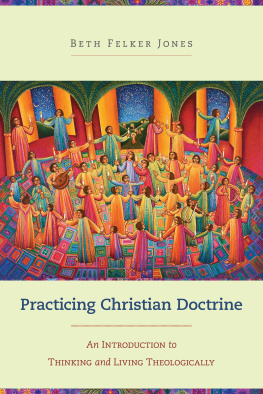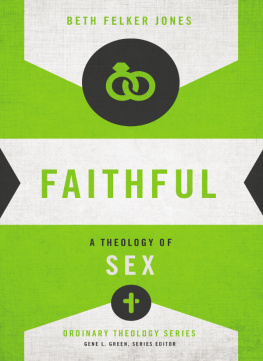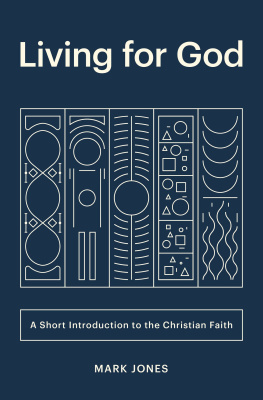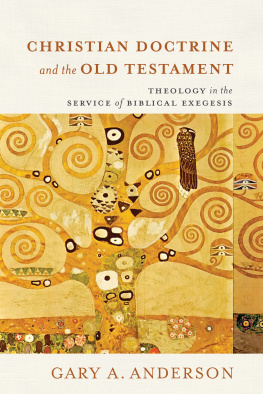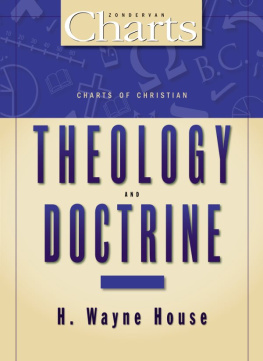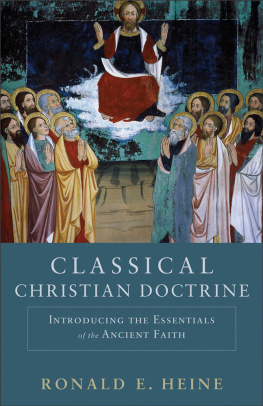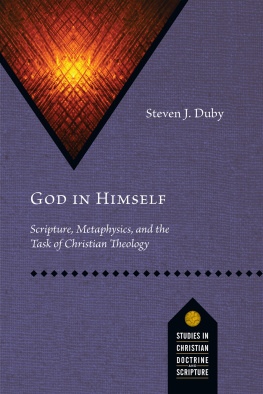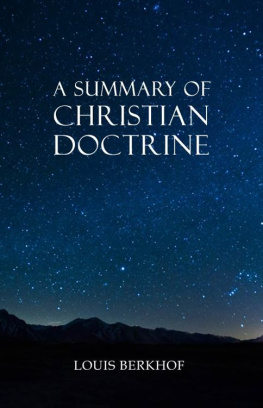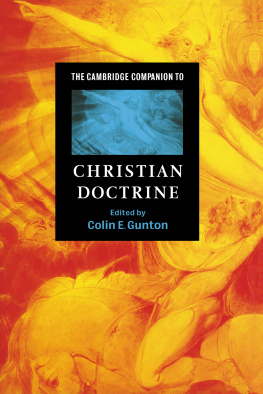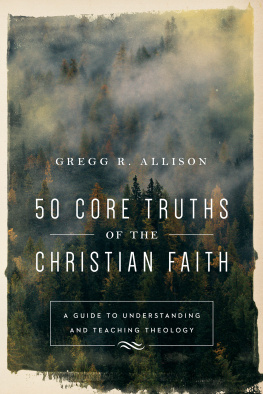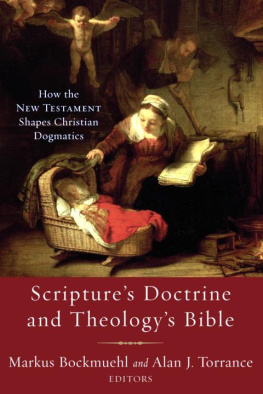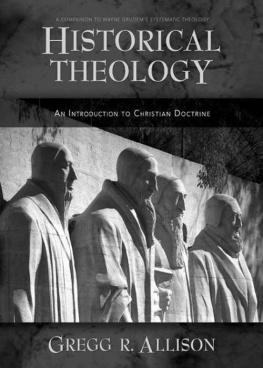2014 by Beth Felker Jones
Published by Baker Academic
a division of Baker Publishing Group
P.O. Box 6287, Grand Rapids, MI 49516-6287
www.bakeracademic.com
Ebook edition created 2014
All rights reserved. No part of this publication may be reproduced, stored in a retrieval system, or transmitted in any form or by any meansfor example, electronic, photocopy, recordingwithout the prior written permission of the publisher. The only exception is brief quotations in printed reviews.
ISBN 978-1-4412-4559-5
Library of Congress Cataloging-in-Publication Data is on file at the Library of Congress, Washington, DC.
Unless otherwise indicated, Scripture quotations are from the New Revised Standard Version of the Bible, copyright 1989, by the Division of Christian Education of the National Council of the Churches of Christ in the United States of America. Used by permission. All rights reserved.
Scripture quotations labeled ESV are from The Holy Bible, English Standard Version (ESV), copyright 2001 by Crossway, a publishing ministry of Good News Publishers. Used by permission. All rights reserved. Text Edition: 2011.
For my students
May the mind of Christ our Savior
live in us from day to day
Contents
Acknowledgments
This project was born of teaching, and I am grateful to my students at Huntington University and Wheaton College, to whom this book is dedicated. It is my privilege to be in conversation with you. Thanks for the good questions, the thoughtful conversations, and the desire to put faith into practice. You have helped make doctrine come alive for me.
I am grateful to many friends and colleagues who helped make this book possible: for the wonderful team at Baker and Brazos; for the support of my dean, Jill Baumgaertner, and associate dean, Jeff Greenman; for the remarkable work of my research assistant, Ella Myer; for my colleague Keith Johnson, with whom I developed some of the early ideas for this text. Thanks to those who gifted me with time and talent, reading and commenting on portions of the text: Aimee Barbeau, Jeff Barbeau, Gary Burge, Lynn Cohick, Holly Taylor Coolman, Michael Graves, Gene Green, George Kalantzis, Tiffany Kriner, Christina Bieber Lake, Tim Larsen, David Lauber, Steve Long, Miho Nonaka, Amy Peeler, Nick Perrin, Noah Toly, and Dan Treier. The book is better because of you all.
Thanks piled on thanks to my husband, Brian, whose support of my work is one of the most tender gifts in my life, and to our children, Gwen, Sam, Tess, and Zeke, for hanging in there with me and enduring my speeches about things like the Trinity.
Chapter 8 and a small portion of chapter 2 appear in slightly different form in my God the Spirit: Introducing Pneumatology in Wesleyan and Ecumenical Perspective . Copyright Cascade Books, 2014. Used by permission of Wipf and Stock Publishers.
Beth Felker Jones
Lent 2013
Introduction
To Practice Doctrine
Times were troubled when Josiah assumed the throne. A brutal invasion and the faithless leadership of several apostate kings had left Israel in chaos. The people of Israel were living desperate and uncertain lives. In the midst of their struggles, they still worshiped the Lord, the God of their ancestors, but they turned to other gods as well, hoping those other gods could help them meet the challenges they faced. God, however, had not forgotten his people or his promises to them. He worked in the heart of the young king, and Josiah began to seek the God of his ancestor David (2 Chron. 34:3). The temple in Jerusalem, the center of worship, had suffered years of neglect and misuse, and Josiah funded carpenters, builders, and masons to begin to restore it. In the midst of the dust flying, the high priest made a discovery, a book of the covenantScripture.
When Josiah heard the ancient words read aloud, he recognized the depth of Israels unfaithfulness. Tearing his robes in grief, he repented, and he took action. After consulting with the prophetess Huldah, Josiah gathered together all the people both great and small and read the book aloud to them. Then, in front of his people, Josiah made a covenant before the L ORD , to follow the L ORD , keeping his commandments, his decrees, and his statutes, with all his heart and all his soul, to perform the words of the covenant that were written in this book (2 Chron. 34:3031). He led his people to join in the same commitment. The entire nation promised to perform the book , to return to faithful relationship with God. Josiah spent the following months purifying Israel. He purged the temple of idols, destroyed altars to idols, and scattered their remains over the graves of false priests. Josiahs reforms culminated in a celebration of Passover, where the people remembered what God had done for them. The discovery of the lost book and the acceptance of its teaching changed the lives of Gods people.
This story may seem like an odd beginning to a book meant to introduce theology, but Josiahs story provides a wonderful window into the relationship between Scripture, doctrine, and practice. Christian theology is a conversation about Scripture, about how to read and interpret it better, how to understand the Bible as a whole and imagine a way of life that is faithful to the God whose Word this is. This conversation about Scripture produces distinct Christian teachings, called doctrine , but the work of theology does not stop there. Notice the key to Josiahs story. He moved directly from the teaching he found in the rediscovered book to action. He immediately connected belief with practice, the Word of God with reform, and he led the people to follow in his footsteps, bringing his community along with him as he sought faithfulness to the true God.
I open with the story of Josiahs reforms in Israel because it displays the core premise of this book: our beliefs must be put into practice, and faithful practice matters for what we believe. When we, like Josiah and his people, perform the book of Scripture, when we connect truth with action and doctrine with discipleship, God does marvelous things.
This books title reflects my confidence that Christian doctrine is intimately interconnected with faithful practice in the Christian life. This book will introduce the basics of Christian doctrine, but without our practicing that doctrine, that introduction will be meaningless. Christian doctrine informs Christian identity and action. Certainly, the idea of doctrine implies belief, but doctrine is about so much more than just believing certain things. The word doctrine has taken on cold, hard connotations. Many assume that it is about rigidity and control or that it points to an inaccessible arena of knowledge outside the realm of ordinary Christians. I hope that this book does some work to rehabilitate the word doctrine , to show ways that good Christian teaching can help us to grow in faith, reach out in love, and look to the future in hope.
The study of doctrine belongs right in the middle of the Christian life. It is part of our worship of God and service to Gods people. Jesus commanded us to love God with our mind as well as our heart, soul, and strength (Luke 10:27). All four are connected: the hearts passion, the souls yearning, the strength God grants us, and the intellectual task of seeking the truth of God. This means that the study of doctrine is an act of love for God: in studying the things of God, we are formed as worshipers and as Gods servants in the world. To practice doctrine is to yearn for a deeper understanding of the Christian faith, to seek the logic and the beauty of that faith, and to live out what we have learned in the everyday realities of the Christian life.

